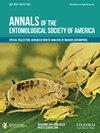引入的褐寡妇蜘蛛(蜘蛛目:黑寡妇科)的捕食可能解释城市栖息地本地黑寡妇的局部灭绝
IF 1.8
3区 农林科学
Q1 ENTOMOLOGY
引用次数: 1
摘要
成功殖民新栖息地的无脊椎动物通常具有高繁殖力、快速发育和早熟的生活史特征。自从它被引入美国佛罗里达州以来,非本地的棕寡妇,棕寡妇(Kock 1841,蜘蛛目:棕寡妇科)迅速扩大了它的活动范围,北至堪萨斯州,西至加利福尼亚州。在其扩张过程中,褐寡妇取代了佛罗里达州的南部黑寡妇,L. mactans (Fabricius 1775,蜘蛛目:蜘蛛科)和加利福尼亚州的西部黑寡妇,L. Hesperus (Chamber lin & Ivie 1935,蜘蛛目:蜘蛛科)。在这里,基于实地调查和受控的实验室实验,我们报告了佛罗里达州南部黑寡妇迅速消失的可能原因。我们的实地调查显示,褐寡妇的生育潜力是南方黑寡妇的两倍。在比较发育的实验中,我们发现相对于南方黑寡妇,亚成年褐寡妇生长更快,成熟更早。在我们与邻居同居的实验中,大胆的棕色寡妇杀死和吃掉害羞的南方黑寡妇的可能性是大胆的蜘蛛网蜘蛛的六倍,与大胆的蜘蛛网蜘蛛同居的可能性是与害羞的南方黑寡妇同居的三倍。我们的母系风险管理模型显示,对稀少猎物的竞争并不是疟蚊后代死亡的重要原因。因此,棕寡妇蜘蛛并不比黑寡妇蜘蛛或其他蜘蛛网蜘蛛早,因为猎物很少。据我们所知,这项研究首次表明,棕色寡妇的侵略性捕食是导致城市结构中害羞的南方黑寡妇局部灭绝的重要因素。本文章由计算机程序翻译,如有差异,请以英文原文为准。
Predation by the Introduced BrownWidow Spider (Araneae: Theridiidae) May Explain Local Extinctions of Native BlackWidows in Urban Habitats
Abstract Invertebrates that successfully colonize new habitats often share life history characteristics including high fertility, rapid development, and early maturation. Since its introduction into Florida, USA, the non-native Brown Widow, Latrodectus geometricus (Kock 1841, Araneae: Theridiidae), has rapidly expanded its range into urban areas as far north as Kansas and as far west as California. During its expansion, the Brown Widow has displaced Florida's Southern Black Widow, L. mactans (Fabricius 1775, Araneae: Tjerodoodae) and California's Western Black Widow, L. Hesperus (Chamber lin & Ivie 1935, Araneae: Theridiidae). Here, based on a field survey and controlled laboratory experiments, we report possible causes for the rapid disappearance of Florida's Southern Black Widows. Our field survey revealed that Brown Widows have twice the fertility potential as Southern Black Widows. In experiments comparing development, we show that sub-adult Brown Widows grew faster and matured earlier relative to Southern Black Widows. In our experiments on cohabitation with neighbors, bold Brown Widows were six times more likely to kill and consume shy Southern Black Widows than bold cobweb spiders and three times more likely to cohabitate with bold cobweb spiders than with shy Southern Black Widows. Our model of maternal risk-management revealed that competition for scarce prey was not a significant cause of offspring mortality for Latrodectus species. Hence, Brown Widows are not predating Black Widows or other cobweb spiders because prey is scarce. To our knowledge, this study is the first to suggest that aggressive predation by Brown Widows is a significant factor contributing to the local extinction of the shy Southern Black Widow in urban structures.
求助全文
通过发布文献求助,成功后即可免费获取论文全文。
去求助
来源期刊
CiteScore
4.90
自引率
0.00%
发文量
25
审稿时长
6-12 weeks
期刊介绍:
The Annals of the Entomological Society of America exists to stimulate interdisciplinary dialogue across the entomological disciplines and to advance cooperative interaction among diverse groups of entomologists. It seeks to attract and publish cutting-edge research, reviews, collections of articles on a common topic of broad interest, and discussion of topics with national or international importance. We especially welcome articles covering developing areas of research, controversial issues or debate, and topics of importance to society. Manuscripts that are primarily reports of new species, methodology, pest management, or the biology of single species generally will be referred to other journals of the ESA. The most important criteria for acceptance are quality of work and breadth of interest to the readership.

 求助内容:
求助内容: 应助结果提醒方式:
应助结果提醒方式:


